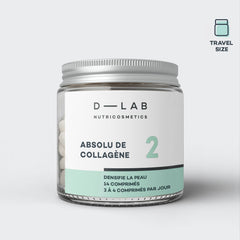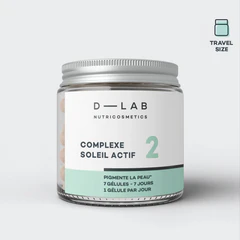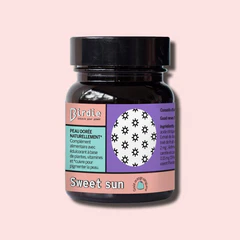
Post-partum hair loss, known as post-partum alopecia, is a common phenomenon in women after childbirth.
In this article, we will review the underlying causes of this condition and the mechanisms associated with it.
Comprendre les facteurs qui contribuent à la post partum hair loss peut aider les femmes à mieux gérer ce problème et à prendre des mesures pour favoriser une repousse saine des cheveux.
I. Reminder of the different phases of a hair
Pregnancy is a time of many hormonal changes for women. These hormonal fluctuations can have an impact on hair growth and health. Post-partum hair loss is a common problem affecting many women.
During pregnancy, chances are your hair was beautiful, dense and silky. But after giving birth, your hair has changed. To better understand post-partum hair loss, it's necessary to remember the different phases of each hair:
The first phase, called the anagen phase, is the period of hair growth, which can last from 2 to 5 years. During this phase, the hair bulb renews itself and produces the hair fiber, with an average of 1 cm of growth per month. The speed and duration of hair growth vary according to factors such as individuality, gender, lifestyle and diet.
The second phase, known as the catagen phase, lasts between 2 and 3 weeks and marks the end of hair fiber production by the bulb.
The third phase, called the telogen phase, is the last phase of the hair cycle. This is when the hair fiber detaches from the hair follicle, without necessarily falling out of the scalp. This period lasts around 3 months, followed by hair loss and the start of a new growth phase.
II. Causes of post-partum hair loss
Hormonal influence
During the second and third trimesters of pregnancy, theincreased production of estrogen-progester hormones prolongs hair growth and reduces hair loss. That's why you've got great hair!
However, after childbirth, hormone production declines, causing the hair cycle to reset.
As a result, hair in the growth and transition phase rapidly moves into the shedding phase, resulting in greater and more rapid hair loss.
This loss is generally noticeable around 3 months after delivery, and it will be several months before you regain your pre-pregnancy hair volume.
For nursing mothers, it's worth noting that hair loss can also occur, but a little later.
Telomeres and the hair cycle
Telomeres, the protective structures at the ends of chromosomes, play an essential role in the life cycle of hair.
During pregnancy, telomeres are thought to lengthen, prolonging the hair growth phase.
After childbirth, telomeres gradually shorten, allowing hair to enter a phase of loss more quickly.
Oxidative stress
Oxidative stress, also associated with post-partum hair loss, is the result of an imbalance between the production of free radicals and the body's ability to neutralize them.
Free radicals can damage scalp cells and weaken hair follicles, which can lead to increased hair loss.
Nutritional factors
Nutritional factors can also contribute to post-partum hair loss.
In the post-partum period, nutritional demands are heightened to support recovery and breastfeeding.
Deficiencies in essential nutrients such as protein, B vitamins, iron and zinc can weaken hair follicles and lead to hair loss.
food supplements hair peuvent aider à améliorer la condition des cheveux en post partum.
Discover the pregnancy and breastfeeding range
III. Solutions to post-partum hair loss
Taking care of your hair
While postpartum hair loss can't be completely avoided, taking care of your hair can help minimize this problem. Here are a few simple tips to keep your hair healthy:
A balanced diet: Make sure you eat a diet rich in essential nutrients such as proteins, vitamins and minerals. They help nourish your hair from the inside out.
Avoid tight hairstyles: Avoid ponytails, tight braids or buns that pull on your hair, as this can damage hair follicles.
Use gentle products: Opt for mild shampoos without harsh chemicals that can irritate the scalp.
Food supplements to help strengthen hair
Food supplements can play a valuable role in reducing post-partum hair loss.
Some supplements contain ingredients specifically formulated to nourish and strengthen hair.
Key nutrients in dietary supplements for postpartum hair loss :
- B vitamins: B vitamins, particularly biotin (vitamin B7), play an essential role in hair health. Biotin helps strengthen hair, improve elasticity and prevent hair loss. Dietary supplements containing B vitamins can help make up for any deficiencies in these nutrients, promoting healthy hair growth.
- Folic acid: Folic acid is important for cell division and DNA synthesis. It is essential for tissue growth, including hair. Dietary supplements containing folic acid can help strengthen hair follicles and promote healthy hair regrowth.
- Zinc: Zinc is an essential mineral that plays a crucial role in hair growth and tissue repair. It also helps maintain a healthy scalp by regulating sebum production. Dietary supplements containing zinc can help stimulate hair growth and reduce excessive hair loss.
- Other nutrients: In addition to B vitamins, folic acid and zinc, other nutrients can also play a role in hair health. For example, omega-3 fatty acids, found in dietary supplements such as fish oil, can help nourish hair and strengthen hair follicles. Similarly, vitamins A, C, D and E, as well as minerals such as iron and selenium, can also help maintain healthy hair.
If post-partum hair loss persists and worries you, it's best to consult a dermatologist or healthcare professional. They will be able to assess your specific situation, look for underlying causes and advise you on suitable treatments.
To conclude
It's important to remember that post-partum hair loss is generally temporary and that your hair will eventually grow back naturally.
In the meantime, take care of yourself, nourish your hair and be patient. Also consider the emotional support you may need during this transition period.
Hormonal fluctuations, changes in telomere structure, oxidative stress and nutritional factors all contribute to this condition. Understanding these causes is essential to help you manage postpartum hair loss effectively.





